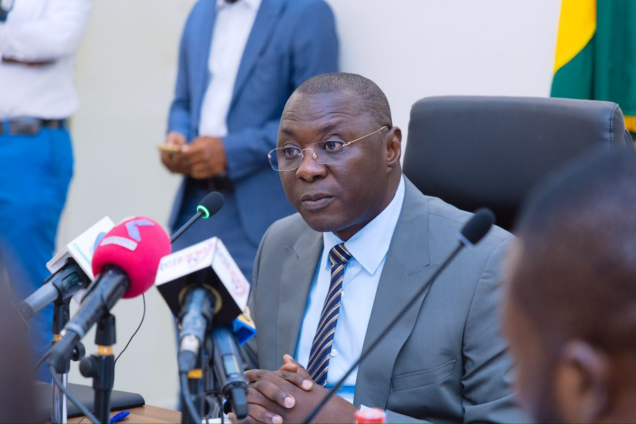The International Monetary Fund (IMF) and the World Bank have maintained their classification of Ghana as a debt distress country, in its latest Joint Debt Sustainability Analysis report.
This is despite the country completing domestic debt exchange programme, completing bilateral debt restructuring, as well as recording some expansion in the economy.
The Bretton Woods Institutions in their report observed that since Ghana is yet to complete the external commercial debt restructuring in line with the IMF-Supported programme parameters, the country remains in debt distress.
The IMF and the World Bank reported that there are still large financing gaps that must be filled through a debt restructuring operation with commercial creditors in line with the Debt Sustainability Analysis and the IMF programme.
IMF and World Bank on Ghana’s Debt Situation
According to the two institutions, despite the completion of the domestic debt restructuring, the Present Value of the total PPG debt-to-GDP breaches its 55 percent benchmark until 2034.
The Debt Sustainability Analysis however acknowledged some progress that Government has made in its domestic debt situation.
“Ghana has also made progress on their comprehensive debt restructuring strategy”, The report revealed.
The report acknowledged that Ghana has made significant progress in the country’s discussions with Official Creditor Committee (OCC) under the G20 Common Framework.
Government on the latest Debt Sustainability Analysis
The government has argued that the score did not improve in the latest analysis because the IMF and World Bank did not factor the progress made with the Bilateral Creditors and Eurobond debt holders .
On expansion of the economy, the government noted that, the IMF and World Bank will often work with the final economic data and not provisional.
The government is of the view that most of the work than have not yet been captured hence the score in the latest Debt Sustainability Analysis.
Government is hopeful the situation will improve in the next round of analysis.
Ghana’s Debt Situation ending December 2022
Data released by Ministry of Finance on debt re-repayment freeze in December 2022 put’s Ghana total external debt at $20 billion.
The Bilateral External debt is pegged at $5.4 billion. The Eurobond bondholders are pegged at $13.1 billion, while the Multilateral Creditors is value at $10.4 billion.
Government has reached a deal with the Bilateral Creditors to restructure the debt.
Improving the situation
The World Bank and the IMF have further argued that the base line projections under the Debt Sustainability Analysis is based on successful programme implementation.
The IMF however warned that delays in implementing the needed adjustment and reforms, compounded with delays in obtaining the external debt relief, may lead to a further weakening of the macro-financial situation.
It is therefore advising government that, finalizing the public debt restructuring, and successfully implementing the reform agenda under the IMF-supported programme, will be necessary to restore debt sustainability.
“Taking into account the authorities’ continuing good faith negotiations with private creditors on a treatment in line with programme parameters, Ghana’s debt would be assessed as sustainable on forward-looking basis” The IMF/World Bank added their report on Ghana.
The baseline assumes strong programme ownership and the authorities’ full commitment to implement the Fund supported program to restore debt sustainability and bring the debt risk rating to “moderate” in the medium term.
This includes in particular reducing the Present Value of Total debt-to-GDP and external debt service to-revenue ratios to 55 and 18 percent, respectively, by 2028.
The IMF added that “ This entails a revenue-based fiscal consolidation with higher spending efficiency and stronger social safety nets and structural reforms to support greater exchange rate flexibility, a more diversified economy and stronger growth”.
IMF on Ghana’s Programme Performance
The IMF in the report also praised government for “steadfast implementation of sound macroeconomic policies”.
The IMF in the report has stated that if Ghana should stick to the conditions under the programme, the country would attain economic recovery before the programme is completed.
Latest Stories
-
Woman dies after being set on fire on NYC subway
14 minutes -
Elon Musk’s curious fixation with Britain
19 minutes -
EBID wins the Africa Sustainability Award
2 hours -
Expansion Drive: Takoradi Technical University increases faculties
6 hours -
SHS heads demand payment of outstanding funds before reopening of schools
7 hours -
We thank God for the 2024 general elections – Akufo-Addo
7 hours -
Coconut Grove Beach Resort marks 30 years of excellence with memorable 9 lessons & carols service
8 hours -
WAFU B U-17 Girls’ Cup: Black Maidens beat Nigeria on penalties to win inaugral tournament
8 hours -
Real Madrid beat Sevilla to keep pressure on leaders Atletico
9 hours -
Liverpool put six past Spurs to go four points clear
9 hours -
Manchester United lose 3-0 at home to Bournemouth yet again
9 hours -
CHAN 2024Q: ‘It’s still an open game’ – Didi on Ghana’s draw with Nigeria
10 hours -
CHAN 2024Q: Ghana’s Black Galaxies held by Nigeria in first-leg tie
10 hours -
Dr Nduom hopeful defunct GN bank will be restored under Mahama administration
11 hours -
Bridget Bonnie celebrates NDC Victory, champions hope for women and youth
11 hours

